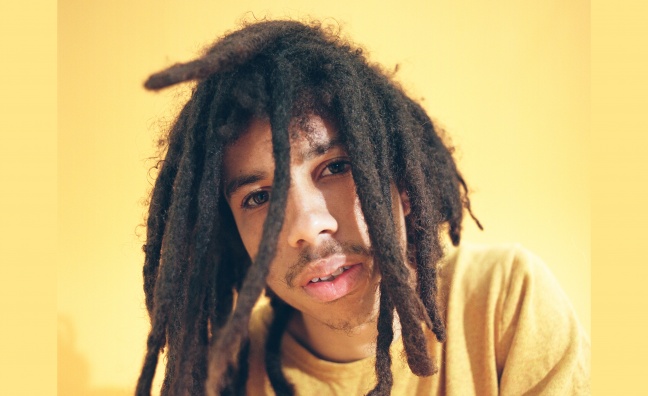Somewhere in New York, London O’Connor is having a very chilled Monday. “I’m at my friend Nancy’s house and she has a pretty nice piano so I’m spending the afternoon playing,” he says. “It’s relaxing.”
Given he’s been surfing between sofas and living out of his backpack for the past couple of years, it’s unsurprising to hear the Californian songwriter say he’s not at home.
But he insists the day he finally gets his own place is nearing and, when he does, his wish list will be tiny. “I’m gonna have four objects: a piano, a microphone, a mattress and a yellow flag with my album title [O?] on it.
That’s all I need,” he says.
This makes him sound like a simple man, but there’s plenty of evidence to the contrary. O’Connor began writing songs aged 10 (he says he “was put on this earth” to do so) and moved to New York at 18 to escape the suburban monotony of his home in San Marcos, California.
When his first single, the loose, articulate Oatmeal, gained traction, he started doing interviews, accompanied by press shots in which his hairy legs protruded from a cotton dress.
He wore it for months on end, a swipe at rap’s traditional masculinity and how suburbia has historically trapped American housewives.
Nowadays, his uniform is a yellow sweater, tight jeans and children’s shoes that fasten with Velcro. He’s been wearing it for “more than 400 days” and will continue to do so until he makes sufficient money from music.
The same eclecticism colours his songs, which smudge together hip-hop and pop to showcase his relatable rap flow, falsetto and production skills.
Brian Eno is his “hero” and Earl Sweatshirt and Frank Ocean are touchstones as much as Radiohead and Daniel Johnston.
Next month, True Panther Sounds will reissue his self-released 2015 debut, a record that brings his experiences living “in a nowhere town” vividly to life.
“I grew up in a place that was so standardised, every house comes in one of four colours and the schools are so specific it feels like they’re not there to teach any one real person,” he says.
“It’s been glossed over in this one size fits everything mentality. On the album I talk about people’s lawns being made out of wax and people still watering them – that shit’s real!”
O’Connor translates his experiences into inspiring, comic choruses that stick in the mind. In time-honoured pop tradition, he wants to encourage people like him to believe in escape. Or, as he puts it “I wanna make utilities for everyone, to equip people.”
He uses latest single Guts as an example. “If a kid plays that over again and plans their escape like I did, and then they get out and push into a new place, that’s a tool.”
More than that, O’Connor is campaigning for self-belief. “If you try and be yourself it’s a very different life,” he says. “Trying to equip people for that different life is the point of these utilities.”
He hopes his music will continue to work for others as it has for him. “Music is the skilful release of tension over time,” he says before hanging up.
“I resolve tension by expressing it through music. I don’t know how to be myself without it, I think this is the only way I can be useful.”










